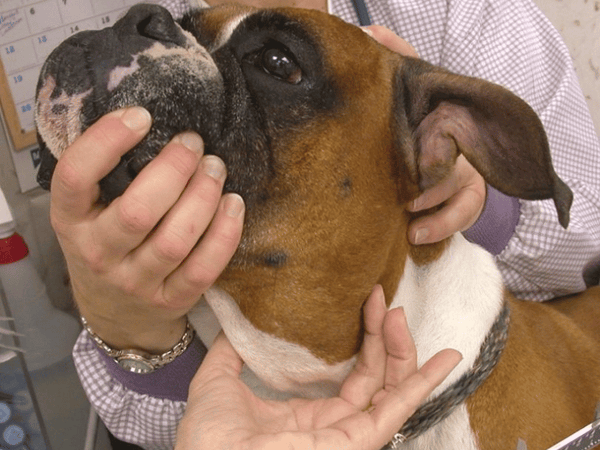Canine lymphoma, a type of cancer affecting the lymphatic system, poses significant challenges for both dogs and their owners. As the disease progresses, recognizing the symptoms and clinical signs of common cancer and treating lymphoma in its final stages becomes crucial for providing appropriate care and support to our beloved pets. In these advanced stages of liver cancer treatment lymphoma, dogs may experience a range of distressing symptoms, signaling the need for attentive and compassionate management.
Moreover, amidst the complexities of canine lymphoma care, the potential benefits of alternative therapies like CBD (cannabidiol) have garnered increasing attention. CBD, derived from the hemp plant, has shown promise in alleviating pain, boosting immunity, and reducing anxiety in dogs. Understanding how CBD can complement traditional treatment approaches is essential for pet owners navigating the complexities of their furry companions' health.
In this article, we delve into the most common symptoms most indicative of the final stages of canine lymphoma, shedding light on the challenges faced by dogs in this critical phase. Furthermore, we explore the potential role of CBD in supporting dogs with lymphoma, discussing its efficacy in managing pain, enhancing immunity, and alleviating anxiety. By combining insights into symptom recognition and CBD's therapeutic potential, we aim to empower pet owners with the knowledge needed to provide comprehensive care for their canine companions battling lymphoma.
Symptoms of Final Stages of Canine Lymphoma
As canine lymphoma progresses to its final stages, dogs may exhibit a range of symptoms that signify the advanced nature of the disease. Recognizing these warning signs is essential for pet owners to provide comfort and support to their furry friends during this challenging time.
Here are some common signs and symptoms observed in the final stages of canine lymphoma:
Loss of Appetite and Weight Loss

One of the hallmark signs of advanced lymphoma is a significant decrease in a dog's appetite, leading to noticeable weight loss in affected dogs. This decline in a dog's comfortable eating habits can be attributed to various factors, including the cancer's impact on the dog's lymphoma-loving digestive system and the dog's overall weakened condition.
Lethargy and Weakness

Dogs with advanced lymphoma often begin treatment and experience profound lethargy and weakness as the disease progresses. They may show reluctance to engage in physical activity, preferring to rest for extended periods. This lethargy can result from the cancer's systemic effects on the body and the energy expended in battling the illness.
Difficulty Breathing

In some cases, canine lymphoma can affect the respiratory system, leading to difficulty breathing or labored breathing in affected dogs. This symptom may manifest as rapid or shallow breathing, coughing, or wheezing, indicating the presence of tumors or fluid accumulation in lymph nodes in the chest cavity.
Swollen Lymph Nodes

Enlargement of lymph nodes, particularly those lymph nodes located near the surface of other lymph nodes in the body, is a characteristic feature of the early stages of lymphoma. In the final stages of the disease, these lymph nodes may become noticeably swollen and palpable, indicating the aggressive progression of cancer in gastrointestinal lymphoma or other lymph nodes only.
Digestive Issues

Dogs with advanced lymphoma may experience gastrointestinal disturbances following symptoms, such as vomiting, diarrhea, or constipation. These digestive issues can further contribute to weight loss and malnutrition, exacerbating the dog's overall decline in health.
Neurological Symptoms

In rare instances, canine lymphoma may affect the nervous system, leading to neurological symptoms such as seizures, disorientation, or paralysis. These symptoms may arise due to the infiltration of cancer cells into the brain, bone marrow, lymph nodes, or spinal cord, resulting in neurological dysfunction.
As pet owners observe these symptoms in their dogs, it's essential for pet parents and dog parents to seek veterinary guidance promptly. While the final stages of canine lymphoma present significant challenges for both dog and pet parents, timely intervention and supportive care can help improve the dog's quality of life and provide comfort to the dog and pet parent during this difficult time.
Understanding Canine Lymphoma

Canine lymphoma cancer is a prevalent form of cancer in dogs, affecting the lymphatic system, which plays a vital role in the body's immune response. Lymphoma occurs in most dogs when lymphocytes, a type of white blood cell, undergo abnormal proliferation, leading to the formation of tumors in lymphoid tissues throughout the dog's body.
What is lymphoma in dogs?
Lymphoma is a cancer that originates in the lymphocytes, which are white blood cells that are essential components of the immune system. These abnormal cells can accumulate and form tumors in various organs and tissues, including the lymph nodes, spleen, liver, and bone marrow. Canine lymphoma cancer is classified into several subtypes based on the specific type of lymphocyte affected by cancer and the location of the tumors in lymph nodes and bone marrow.
Stages and progression of the disease
Canine lymphoma typically progresses rapidly, with the disease advancing through various stages characterized by the extent of tumor involvement and the spread of the gastrointestinal tract lymphoma or the gastrointestinal tract lymphoma lymph node, to other organs. The staging of lymphoma helps veterinarians assess the severity of the disease and determine the most appropriate treatment approach. Common staging systems include the World Health Organization's (WHO) staging system and the Modified University of Wisconsin's (UW) staging system.
Treatment options and prognosis
The treatment of canine lymphoma often involves a combination of chemotherapy, radiation therapy, and supportive care measures. Chemotherapy is the primary treatment modality and radiation therapy has been shown to induce remission and improve survival rates in many cases diagnosed lymphoma in dogs. However, the prognosis for dogs with lymphoma can vary depending on factors such as the subtype of lymphoma, the stage of the disease, and the dog's overall health status.
While canine lymphoma can be a challenging diagnosis to navigate, advancements in veterinary oncology and supportive care have provided pet owners with more options for managing the disease and improving their dogs' quality of life. By understanding their dog's cancer, the nature of common stages of lymphoma, and the available treatment options, pet owners can make informed decisions about their dogs' care and support them through their journey with this complex disease.
How CBD Can Help Dogs with Lymphoma
In recent years, cannabidiol (CBD) has emerged as a potential therapeutic option for managing various health conditions in both humans and animals to treat various lymphoma in dogs. When it comes to canine lymphoma, CBD offers promising benefits that can complement traditional treatment approaches and improve the overall well-being of affected dogs.
Here's how CBD can help dogs with lymphoma:
Pain Management
CBD has been recognized for its analgesic properties, making it a valuable tool in alleviating pain associated with canine lymphoma. Dogs in the final stages of lymphoma may experience discomfort and pain due to tumor growth, inflammation, or treatment side effects. CBD interacts with the endocannabinoid system in the body, modulating pain perception and reducing inflammation, thereby providing relief for dogs experiencing pain.
Boosting Immunity
A robust immune system is essential for dogs battling lymphoma, as it plays a crucial role in fighting off cancer cells and supporting overall health. CBD has been shown to have immunomodulatory effects, helping to regulate the immune system in response and enhance the body's ability to combat disease. By bolstering immunity, CBD may aid in slowing the progression of lymphoma and improving the dog's resilience against infections and other complications.
Managing Anxiety and Stress
Dogs with lymphoma often experience heightened levels of anxiety and stress, both as a result of the disease itself and the associated treatment procedures. CBD has been studied for its anxiolytic properties, which promote relaxation and reduce stress levels in dogs. By calming the nervous system and alleviating anxiety, CBD can help improve the dog's overall quality of life and make the treatment process more manageable for both the pet and its owner.
Supporting Overall Well-being
Beyond its specific therapeutic effects, CBD can contribute to the overall well-being of dogs with lymphoma by addressing various symptoms and promoting balance within the body. CBD's anti-inflammatory properties may help reduce swelling and discomfort associated with swollen lymph nodes, while its antioxidant properties can help protect cells from damage caused by free radicals. Additionally, CBD's calming effects may improve sleep quality and appetite in dogs undergoing lymphoma treatment.
Alive Market CBD Oil For Pets
Alive Market CBD Oil For Pets is a revolutionary product designed to enhance the well-being of our beloved furry friends. Infused with high-quality CBD, this oil offers a natural solution to common pet health issues. CBD has been shown to alleviate pain by interacting with the endocannabinoid system, which regulates various bodily functions, including pain sensation.
Moreover, CBD can boost immunity in pets by supporting their endocannabinoid system, thus aiding in overall health and resilience against illnesses. Additionally, CBD has been found to have calming effects, making it an effective remedy for anxiety and stress in pets. Whether your pet is struggling with pain, low immunity, or anxiety, Alive Market CBD Oil For Pets offers a safe and effective solution to promote their well-being and vitality.
Incorporating CBD into Canine Lymphoma Care
While CBD shows promise as a complementary therapy for younger dogs with lymphoma, it's essential for dog lovers and anyone else to have older dogs approach its integration into their dog' care regimen thoughtfully and responsibly. Here are key considerations for pet and dog owners looking to incorporate CBD into their dog's' lymphoma treatment plan:
Dosage and Administration: Determining the appropriate dosage of CBD for a dog with lymphoma requires careful consideration of factors such as the dog's weight, overall health, and the severity of their symptoms. It's crucial to start with a low dose and gradually increase it as needed while monitoring the dog's response closely. CBD is available in various forms, including oils, tinctures, capsules, and treats, allowing pet owners to choose the most suitable administration method for their dog's preferences and needs.
Potential Risks and Precautions: While CBD is generally considered safe for dogs, there are potential risks and precautions to be aware of, especially when using higher doses or in combination with other medications. Possible side effects of CBD in dogs may include drowsiness, dry mouth, and gastrointestinal upset. Additionally, CBD can interact with certain medications, so pet owners should consult with their veterinarian before administering CBD to a dog undergoing other treatments for lymphoma.
Consultation with a Veterinarian: Before starting a CBD regimen for a dog with lymphoma, pet owners should consult with a veterinarian who is knowledgeable about the use of CBD in veterinary medicine. A veterinarian can provide personalized guidance based on the dog's individual health status and treatment plan, ensuring that CBD is used safely and effectively as part of the dog's prognosis and overall care.
Monitoring and Adjustments: Regular monitoring of the dog's response to CBD is essential to assess its efficacy and make any necessary adjustments to the dosage or treatment plan. Pet owners should observe their dog's behavior, appetite, and overall well-being, noting any changes or improvements that may occur with CBD supplementation. Open communication with the veterinarian is key to ensuring that the dog's treatment plan remains optimal throughout their journey with lymphoma.
Conclusion
Understanding the final stages of canine lymphoma and exploring the potential benefits of CBD for supporting dogs with this challenging condition are crucial steps for pet owners seeking to provide the best possible care for their furry companions. As dogs progress rapidly through the advanced stages of lymphoma, recognizing the symptoms indicative of the late stages of the disease's severity becomes essential for timely intervention and compassionate management.
The symptoms of the final stages of canine lymphoma, including loss of appetite, increased thirst, lethargy, difficulty breathing, swollen lymph nodes, digestive issues, and neurological symptoms, serve as important indicators of the dog's overall health and well-being. By staying vigilant and proactive in monitoring these symptoms, pet owners can better support their dogs through the end stages of this difficult phase of end-of-life care for their beloved companion and their journey with lymphoma.
Furthermore, the potential benefits of CBD in managing pain, boosting immunity, and alleviating anxiety offer hope for dogs and their owners facing the challenges of lymphoma treatment. CBD's natural properties make it a valuable addition to the holistic care regimen for many dogs diagnosed with lymphoma, providing relief from symptoms and improving their quality of life.
Incorporating CBD into a pet parent's or dog's lymphoma and care plan should be done in consultation with a veterinarian, who can provide personalized guidance for successful treatment and ensure the safe and effective use of CBD alongside traditional treatment modalities. By working together with veterinary professionals and staying informed about the latest developments in dog lymphoma management, pet owners can optimize their dogs' chances of a positive outcome and provide them with the love and support they need throughout their battle with this complex disease.
In conclusion, by combining knowledge of lymphoma, clinical signs and symptoms, traditional veterinary care, and emerging therapies like CBD, pet owners can empower themselves to make informed decisions and provide the best possible care for their beloved canine companions facing lymphoma. With dedication, compassion, and collaboration, we can strive to improve the lives of dogs affected by this challenging condition and support them on the final stage of their journey to health and healing.


